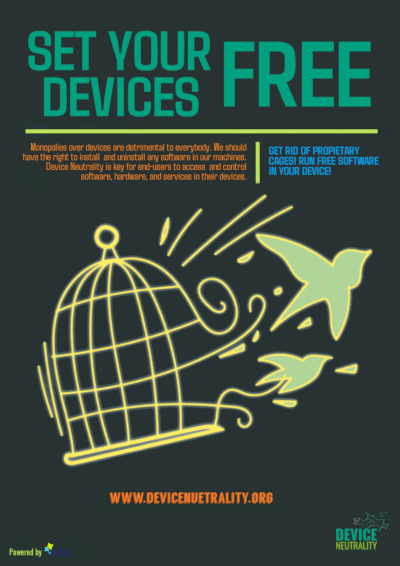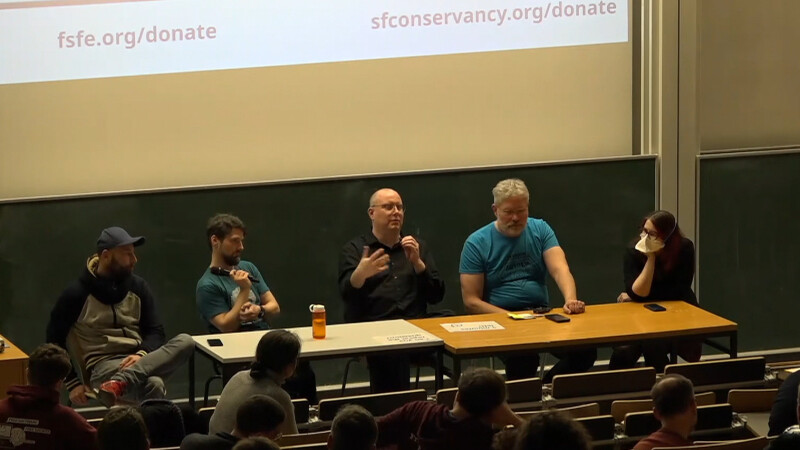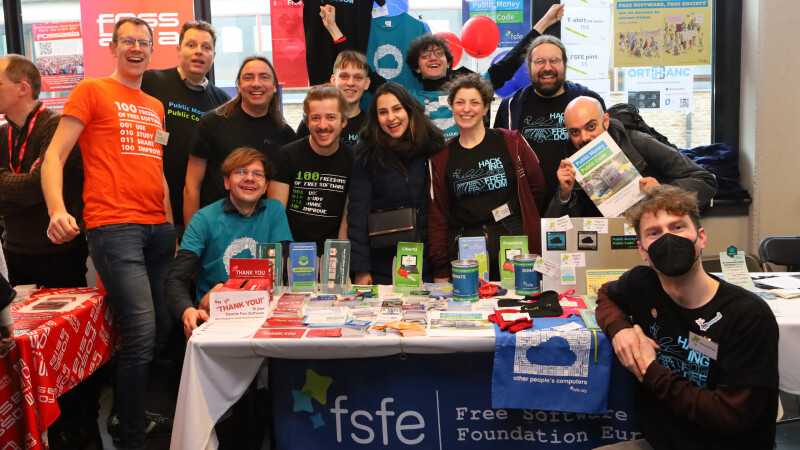Let’s make Device Neutrality a reality in Europe!
As the Digital Markets Act comes into effect today, Device
Neutrality starts to become a tangible reality in the European Union.
While acknowledging the new law, the FSFE alerts that this is only the first
step and further commitment is necessary.

Digital devices are becoming increasingly important tools in our
daily tasks, with more and more of us using them in different areas of
our lives. However, we, as end-users, are losing control over them –
especially the ability to run Free Software – due to unfair practices by
device manufacturers, vendors, and platforms.
Device Neutrality aims to
restore end-user control over devices by
ensuring software freedom in devices, protecting users from lock-ins and
promoting their control over data in devices. It seeks to enable
end-users to run the software of their choice and use services
independently of the control exercised by hardware manufacturers,
vendors, and platforms, known as gatekeepers.
Some aspects of Device Neutrality are imposed on large tech
companies by the Digital
Markets Act (DMA), a recent EU law that
enters into force on 7 March, to reestablish higher degrees of
competition in digital markets. Therefore, the
DMA will be applicable
to six gatekeepers: Alphabet, Amazon, Apple, Bytedance, Meta, and
Microsoft.
The FSFE has been involved with the DMA throughout the legislative process,
and welcomes its entry into force, which makes several elements of
Device Neutrality legally enforceable. However, while the DMA represents
a very important step in holding gatekeepers accountable for their
negative disruptions and distortions in digital markets, the law alone
is not enough to promote Device Neutrality to the extent necessary to
re-empower end-user control over devices.
The Digital Markets Act: only a first step towards Device
Neutrality
Initially, the enforcement of the DMA will be
challenging, as the law addresses diverse aspects of devices including
the (un)installation of software, the use of third-party apps stores
and payment systems, interoperability obligations for operating systems
and messaging apps, and some degree of real-time data portability.
Imposing legal obligations on such elements will require considerable
enforcement efforts and proper monitoring of the technical solutions
implemented by the gatekeepers.
Besides, similarly to Router
Freedom where network operators create
various barriers and hurdles for end-users to exercise that right,
gatekeepers may try hard to avoid implementing solutions that will
fully benefit end-users, but rather may use the law in ways that can hinder
end-users’ rights related to Device Neutrality. For instance, the tech
company Apple – one of the gatekeepers – has already gone to court to
avoid the DMA obligations, and decided to implement an
absurd strategy against third-party apps
stores (PDF) that will negatively impact the ability of
alternatives such as F-Droid to enter iOS environments.
For these reasons, the FSFE will collaborate with the
European Commission and other regulators to monitor compliance with the
DMA, so that the DMA will act as a catalyst for Device Neutrality rather than an
additional barrier to it.
“DMA represents a bold step from the EU to regulate large
companies acting as gatekeepers over devices. However, proper
implementation of the law will be challenging, and it will require
strict monitoring from civil society to safeguard Device Neutrality.
Open Internet needs Device Neutrality. Free Software is key to achieve
that”.
-Lucas Lasota, FSFE’s Legal Programme Manager -
Going beyond very large platforms
The DMA is limited to big tech companies. The law only applies to
enterprises providing services to at least 45 million monthly active
end-users established or located in the EU on a yearly basis. Taking into
account other quantitative restrictions, Device Neutrality is safeguarded
by the law against only a handful of gatekeepers.
Smaller companies may also engage in predatory behavior against
Device Neutrality, negatively impacting end-users' rights. However, they
are not covered by the DMA.
That’s why the FSFE is promoting Device Neutrality in a much broader
context to include not only large companies but any device
manufacturer, vendor, or platform. We strongly believe that software
freedom should be the default standard and end-users should not be
imprisoned into lock-ins. Tech companies should not trap users into
walled gardens that limit what they can do with their devices.

Check the new webpage for
Device Neutrality and
help
spread the word with our poster!
In parallel to its involvement with the DMA, the FSFE is launching a
new website for Device Neutrality to raise public awareness of topics
concerning Device Neutrality. This site points to in-depth insights
about Device Neutrality and Free Software, downloadable promotional
material, and ways to spread the word. Check it out!
Supporting the work on Device Neutrality
Higher degrees of openness and equality in digital markets can only
be achieved when end-users can enjoy software freedom with their
devices. The DMA is the first step, and the FSFE will continue to work
for Device Neutrality in different areas: monitoring DMA
implementation, overseeing compliance, collaborating with regulators
and policy makers, promoting public awareness, and expanding the
agenda beyond gatekeepers. For that, we count on your support for our
work with a donation. Get active and help us empower you to regain
control over your devices!
I want to donate for Device Neutrality!
Support FSFE



 Check the new webpage for
Check the new webpage for 
 Our team and volunteers at our FOSDEM 2024 booth!
Our team and volunteers at our FOSDEM 2024 booth!